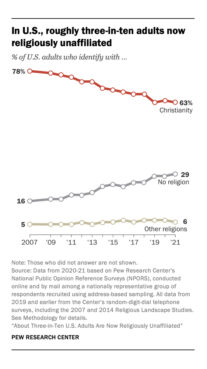
(RNS) — Atheists in the U.S. are more likely to hide their beliefs if they are women, Republicans, if they live in the South or if they’ve previously been religious, according to new research by Rice and West Virginia universities.
“If someone is already in a marginalized group — like women — or are members of a group that is heavily religious — such as Republicans or Southern Americans — it stands to reason they are less likely to take on the additional stigma of being an ‘out’ atheist,” said Jacqui Frost, a postdoctoral research fellow in sociology and the Religion and Public Life Program at Rice University.
With this new study, “Patterns of Perceived Hostility and Identity Concealment among Self-Identified Atheists,” Frost said researchers wanted to explore whether people who affirm atheist labels are more comfortable than other nonreligious people about sharing their atheism with others.
The research showed that atheists are the most likely nonreligious group to perceive stigma, yet among people who identify as atheist, agnostic or simply nonreligious, atheists are the most open about their beliefs, which Frost found surprising.
RELATED: New report finds nonreligious people face stigma and discrimination
“The people that are being most discriminated against are also the people that are least likely to hide their identities,” Frost, one of the report’s authors, told Religion News Service.
However, that’s not true for everyone.
In groups that statistically have the fewest number of atheists, the atheists among them are less vocal. This includes women; people who are in very religious spaces, such as Republicans; and people in the South — all of whom were more likely to hide their identities, Frost said.
“The people that are less likely to take on an atheist label in other studies were also the people that were less likely to want to share their atheism with people in our study,” Frost added.
The report’s authors write that organizations such as American Atheists — a national civil rights group that seeks to achieve religious equality for all Americans — may “make it easier for atheists to choose identity affirmation over concealment, even in the face of perceived hostility.”
Alison Gill, vice president for legal and policy for American Atheists, said atheist and secular groups can help provide community and social connection to nonreligious people.
“Especially in very religious areas, atheists often encounter stigma and discrimination, which can negatively impact their health and well-being, resulting in loneliness, social isolation and even depression,” Gill said. “Research shows that membership in local and national secular organizations can provide support and help protect against these negative outcomes.”
American Atheists released a report in 2020 detailing the stigma and discrimination nonreligious people face in their communities and soon will release a new report focusing on atheist and nonreligious women. Gill said there continues to be a stereotype that all atheists are men, when in fact “atheists and secular communities are diverse and vibrant.”
RELATED: 1 in 5 Latino Americans have no religion, the Latinx Humanist Alliance says
The data from the Rice and West Virginia universities’ report comes from the 2019 Experiences with Religious Discrimination Study, which included 4,774 individuals who completed a survey assessing the hostility they perceive from others due to their religion or nonreligious identities. For this particular analysis, researchers limited the data to 721 individuals who identified as atheist.
The report comes as Pew Research Center data show that the U.S. nonreligious population has grown from 16% in 2007 to 29% in 2021. Only 4% identify as atheists.
With this growing demographic of nonreligious people, Frost said it’s important to understand “who they are, what their identities are like and what they believe.” While atheists don’t experience as much discrimination as Muslims or Jewish people, Frost said, “we don’t want any group to be discriminated against.”
“Understanding what kinds of discrimination atheists are experiencing and how that shapes whether or not they’re willing to share their identity with others is important,” she said.
This work, Frost said, is also crucial to reflect how “we measure nonreligious people.”
“If atheists are afraid to tell other people they’re atheists, then there may be more atheists out there than we’re actually capturing,” she said.
RELATED: In LA, ‘Atheist Pirates’ remove religious signs from public streets and overpasses

